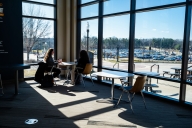You have /5 articles left.
Sign up for a free account or log in.

Getty Images
Mykle Hoban, a doctoral student at the Hawaii Institute of Marine Biology, had planned to leave this week for a two-month stint at the Smithsonian’s National Museum of Natural History.
He would use that time to complete a formal description of a new species of the combtooth blenny, a fish found in tropical waters across the world that Hoban has studied as part of his doctoral research. But after a partial federal shutdown took effect last month, the status of the National Science Foundation-funded trip is up in the air.
Hoban’s travel and accommodations are paid for, but it’s not clear if the museum will actually be open when he arrives.
“I’m not really sure where it stands, largely because no one can answer their emails,” he said.
The ongoing federal shutdown is already creating headaches for scientists by hindering research planning and putting an abrupt halt to travel for some academics. But its worst effects will materialize in the coming weeks, should a stalemate between the White House, Republicans and congressional Democrats continue, researchers and university leaders said.
Lawmakers last year passed legislation funding the majority of federal agencies, including the Education Department and the National Institutes of Health. But they left town before resolving a dispute over a border wall demanded by President Trump and without funding several agencies that are big supporters of research at colleges across the country -- among them the National Science Foundation, the Department of Agriculture, the National Oceanic and Atmospheric Administration, and the National Endowment for the Humanities.
For academics whose work is supported by the federal government, the shutdown means they can’t communicate with most employees at those affected agencies. And some federal data will be unavailable to researchers or the public. The shutdown also creates uncertainty over the next round of research funding awards, as proposals aren't processed and peer-review committees aren't meeting. As it persists, unanswered questions over funding will have a ripple effect on the status of professors, postdocs and graduate students.
“It’s a bad situation and it’s going to get worse the longer this goes on,” said Mary Lidstrom, vice provost for research at the University of Washington.
The university is one of a handful of institutions that brings in more than a billion dollars each year in federal research grants. That means UW is particularly affected by the shutdown, Lidstrom said.
Since the shutdown began, the university has allowed researchers to continue spending in anticipation that already approved expenses would reimbursed by federal agencies; the government typically pays for research via reimbursement after institutions submit invoices. By mid- to late January, the university will likely have to re-evaluate what it's comfortable spending without new federal funding, Lidstrom said.
The timing of the shutdown is especially unfortunate because institutions are well into the graduate student admissions cycle. The spring semester is when researchers typically look at their funding outlook to make decisions about the hiring of new graduate students.
The new funding uncertainty means many of the hard science programs whose work is funded by agencies like NSF may be less likely to offer positions to graduate students and postdoctoral researchers.
“Most laboratories run kind of like small businesses,” said Eric Saltzman, a distinguished professor of earth system science at the University of California, Irvine. “Once uncertainty gets high, then people get conservative.”
Saltzman, whose work is supported by NSF, studies how the atmosphere is shaped by climate change. He received research grant funding before the shutdown went into effect, but he said scientists are always anticipating where the money for their next research project will come from. And the shutdown delays peer reviews of new proposals as well as decisions on grant awards.
Because of the federal agencies involved, the shutdown will impact researchers working in the earth sciences in particular, hampering momentum in areas like climate change.
“Our country has a long history of supporting science via federal agencies,” said Tessa Hill, a marine scientist who studies the effects of climate change at University of California, Davis. “At times like this, you start to see how important those agencies are.”
Hill, who received backing from the National Science Foundation last year for efforts to study how ecosystems respond to rapid changes in the climate, has been unable to contact colleagues at NOAA about a separate research proposal because of the shutdown.
“We can’t get ahold of people we would include as partners in the research because they’re federal employees,” she said.
Plans for Scientific Conferences Scrambled
The shutdown is also putting a damper on academic and scientific conferences planned for the beginning of the year. In some cases, it will mean lower attendance as researchers at federal agencies cancel travel plans as travel expenses go unpaid. In others, academic conferences have been scuttled entirely.
The American Astronomical Society estimates that about 15 percent of registrants won’t be able to attend its annual conference in Seattle this week. That means many of the panels or presentations for the conference may be canceled because of those absences.
In a Facebook post last week, AAS executive officer Kevin Marvel said the organization was taking steps like allowing live-streaming of panels for registrants who are unable to attend and allowing co-authors to make presentations when lead authors are unable to attend.
NSF scientists were also missing from the Society for Integrative and Comparative Biology conference this weekend in Tampa, Fla., and the shutdown was expected to hurt attendance for the American Meteorological Society’s meeting in Phoenix starting this weekend.
Meanwhile, the USDA’s Interagency Research Forum on Invasive Species, set to be held from Jan. 8-11 in Annapolis, Md., was called off entirely, according to a statement on the agency’s website.
The University of Maryland at College Park is uniquely affected by the shutdown. The university is the only large public research university within the Beltway. And it houses several centers formed through partnerships with federal agencies, among them the Joint Quantum Institute, which brings together researchers from Maryland’s physics department, the National Institute of Standards and Technology, and the Laboratory for Physical Sciences.
With the shutdown in effect, those federal scientists can’t show up to work or interact with university researchers and graduate students.
“This comes at a time when quantum science has been really relevant because of competition with China,” said Laurie E. Locascio, vice president for research at the university. “They’re moving fast and we want to continue to move fast.”
The funding dispute could be an especially long one. And there are no signs of a resolution happening soon -- on Friday, President Trump warned a shutdown could go on for “months, or even years.”
For academics who rely on federal funding, government shutdowns are becoming somewhat familiar. The shutdown that began in December is the third since the beginning of 2018. By Tuesday, it will enter its 18th day. The last multiweek shutdown, in 2013, lasted 16 days. The longest ever federal shutdown lasted 21 days, spanning from 1995 to 1996.
“I’ve been through this before,” Saltzman said. “You try to plan as best you can. Of course, nobody has a crystal ball.”








